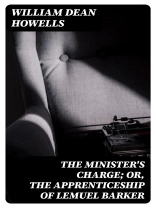In ‘The Minister’s Charge; Or, The Apprenticeship of Lemuel Barker, ‘ William Dean Howells deftly explores the themes of personal growth, moral dilemmas, and societal expectations through the journey of its titular character, Lemuel Barker. Set against the backdrop of 19th-century America, Howells employs a realistic literary style characterized by nuanced characterizations and a focus on social realism. The narrative intricately weaves together Barker’s struggles as an apprentice to a minister, highlighting the tension between individual aspirations and communal obligations, whilst showcasing Howells’ mastery of dialogue and psychological depth. William Dean Howells, often hailed as the ‘Dean of American Letters, ‘ was an influential figure in the development of literary realism in the United States. His experiences during the transformative period of the Gilded Age, combined with his upbringing in a modest household, undoubtedly informed his insightful portrayals of character and society. Howells was committed to depicting the complexities of everyday life, as evidenced in his own writings, leading him to create a narrative that addresses moral predicaments faced by those at the intersection of tradition and modernity. This book is highly recommended for readers interested in the interplay between morality and personal agency within the framework of American society. Howells’ work serves as an essential commentary on the pressures and paradoxes of religious and societal expectations, making it a vital read for those seeking a deeper understanding of personal and cultural identity in American literature.
लेखक के बारे में
William Dean Howells (1837-1920) was a preeminent figure in American literature during the late 19th and early 20th centuries. Known as the ‘Dean of American Letters’, Howells was influential as a novelist, literary critic, and playwright. His work exerted a profound impact on American realism, and he is often credited with bringing the literary approach to the forefront of American fiction. Howells served as the editor of the ‘Atlantic Monthly’ and became a champion of many writers, including Mark Twain and Henry James.
His literary style blended gentle humor, social commentary, and keen observations of everyday life. One of his notable works, ‘The Minister’s Charge; Or, The Apprenticeship of Lemuel Barker’ (1886), exemplifies his skill in creating richly detailed characters and exploring the social issues of his time. In this book, as in many of his works, Howells examines the clash between the individual and societal expectations, a recurring theme in his extensive body of work. Howells’ commitment to realism and his nuanced explorations of ethical dilemmas secured his place as not just a chronicler of his era but also a thoughtful critic of American social mores.












